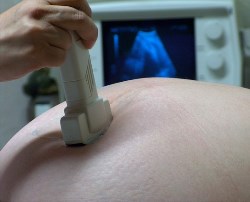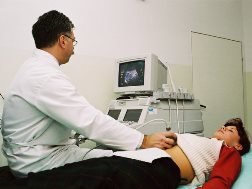How to Select the Best Ultrasound Technician Training Program near Ontario Oregon
 Once you have decided to obtain an ultrasound technician degree near Ontario OR, the next step is to start the procedure of choosing a school. To begin with, you have to find the ideal program that will furnish the necessary training to become a qualified professional. And since a number of states do require that ultrasound techs be either certified or licensed, depending on where you will practice you may also need preparation to pass a certification or licensing examination. So it’s very important that you research each school so that you can evaluate and compare your options. But just where does one begin? Many potential students will start by searching for colleges that are within commuting distance of their residences and then by comparing tuition. Naturally location and cost should be considered when arriving at a decision, but there are additional significant factors as well. Such as, if the ultrasound technician schools have earned accreditation or if they sponsor internship programs. These and other qualifications will be covered more in detail later in this article. But to start with, let’s go over what an ultrasound tech does and the degrees and online education programs that are offered.
Once you have decided to obtain an ultrasound technician degree near Ontario OR, the next step is to start the procedure of choosing a school. To begin with, you have to find the ideal program that will furnish the necessary training to become a qualified professional. And since a number of states do require that ultrasound techs be either certified or licensed, depending on where you will practice you may also need preparation to pass a certification or licensing examination. So it’s very important that you research each school so that you can evaluate and compare your options. But just where does one begin? Many potential students will start by searching for colleges that are within commuting distance of their residences and then by comparing tuition. Naturally location and cost should be considered when arriving at a decision, but there are additional significant factors as well. Such as, if the ultrasound technician schools have earned accreditation or if they sponsor internship programs. These and other qualifications will be covered more in detail later in this article. But to start with, let’s go over what an ultrasound tech does and the degrees and online education programs that are offered.
Click Here to Get Free Information on Ultrasound Technician Schools!
Ultrasound Tech Occupation Description
 There are more than one acceptable titles for ultrasound techs (technicians). They are also referred to as sonogram techs, diagnostic medical sonographers (or just sonographers) and ultrasound technologists. Regardless of name, they all have the same primary job description, which is to implement diagnostic ultrasound testing on patients. While a number of techs work as generalists there are specialties within the profession, for example in pediatrics and cardiology. The majority work in Ontario OR clinics, hospitals, private practices or outpatient diagnostic imaging centers. Routine daily job tasks of an ultrasound technician can consist of:
There are more than one acceptable titles for ultrasound techs (technicians). They are also referred to as sonogram techs, diagnostic medical sonographers (or just sonographers) and ultrasound technologists. Regardless of name, they all have the same primary job description, which is to implement diagnostic ultrasound testing on patients. While a number of techs work as generalists there are specialties within the profession, for example in pediatrics and cardiology. The majority work in Ontario OR clinics, hospitals, private practices or outpatient diagnostic imaging centers. Routine daily job tasks of an ultrasound technician can consist of:
- Preserving records of patient case histories and details of each procedure
- Counseling patients by explaining the procedures and answering questions
- Preparing the ultrasound machines for testing and then cleaning and recalibrating them
- Escorting patients to treatment rooms and ensuring their comfort
- Using equipment while minimizing patient exposure to sound waves
- Reviewing the results and identifying need for further testing
Sonographers must frequently evaluate the performance and safety of their equipment. They also are held to a high ethical standard and code of conduct as health practitioners. In order to sustain that level of professionalism and remain current with medical knowledge, they are mandated to complete continuing education courses on a regular basis.
Ultrasound Technician Degrees Offered
 Sonogram technician enrollees have the opportunity to acquire either an Associate Degree or a Bachelor’s Degree. An Associate Degree will normally involve around 18 months to 2 years to complete based upon the course load and program. A Bachelor’s Degree will take longer at up to four years to finish. Another option for those who have previously received a college degree is a post graduate certificate program. If you have obtained a Bachelor’s Degree in any major or an Associate Degree in a relevant health field, you can instead choose a certificate program that will require only 12 to 18 months to finish. Something to bear in mind is that most sonographer colleges do have a clinical training component as part of their course of study. It often may be satisfied by participating in an internship program which numerous colleges set up with Ontario OR clinics and hospitals. Once you have graduated from one of the certificate or degree programs, you will then need to fulfill the licensing or certification prerequisites in Oregon or whatever state you decide to practice in.
Sonogram technician enrollees have the opportunity to acquire either an Associate Degree or a Bachelor’s Degree. An Associate Degree will normally involve around 18 months to 2 years to complete based upon the course load and program. A Bachelor’s Degree will take longer at up to four years to finish. Another option for those who have previously received a college degree is a post graduate certificate program. If you have obtained a Bachelor’s Degree in any major or an Associate Degree in a relevant health field, you can instead choose a certificate program that will require only 12 to 18 months to finish. Something to bear in mind is that most sonographer colleges do have a clinical training component as part of their course of study. It often may be satisfied by participating in an internship program which numerous colleges set up with Ontario OR clinics and hospitals. Once you have graduated from one of the certificate or degree programs, you will then need to fulfill the licensing or certification prerequisites in Oregon or whatever state you decide to practice in.
Online Ultrasound Tech Classes
 As previously mentioned, almost all sonogram technician colleges have a clinical requirement to their programs. So while you can receive a degree or certificate online, a substantial part of the training will be either carried out in an on-campus lab or at a sponsored off-campus facility. Practical training can often be fulfilled by means of an internship at a local Ontario OR outpatient clinic, hospital or private practice. However the remainder of the classes and training may be accessed online in your Ontario home. This is particularly beneficial for those individuals that continue working while obtaining their degrees. Plus online programs are often less costly than on campus alternatives. Expenses for study materials and commuting can be decreased also. But just as with any sonographer program you are considering, make sure that the online school you enroll in is accredited. One of the most highly respected accrediting organizations is the Commission on Accreditation of Allied Health Education Programs (CAAHEP). Accreditation is particularly crucial for certification, licensing and finding employment (more on accreditation later). So if you are disciplined enough to learn away from the classroom in the comfort of your own home, then an online school could be the ideal choice for you.
As previously mentioned, almost all sonogram technician colleges have a clinical requirement to their programs. So while you can receive a degree or certificate online, a substantial part of the training will be either carried out in an on-campus lab or at a sponsored off-campus facility. Practical training can often be fulfilled by means of an internship at a local Ontario OR outpatient clinic, hospital or private practice. However the remainder of the classes and training may be accessed online in your Ontario home. This is particularly beneficial for those individuals that continue working while obtaining their degrees. Plus online programs are often less costly than on campus alternatives. Expenses for study materials and commuting can be decreased also. But just as with any sonographer program you are considering, make sure that the online school you enroll in is accredited. One of the most highly respected accrediting organizations is the Commission on Accreditation of Allied Health Education Programs (CAAHEP). Accreditation is particularly crucial for certification, licensing and finding employment (more on accreditation later). So if you are disciplined enough to learn away from the classroom in the comfort of your own home, then an online school could be the ideal choice for you.
What to Ask Ultrasound Tech Schools
 As soon as you have determined which certificate or degree that you would like to earn, you can start the process of assessing and comparing sonogram technician colleges. You will first probably want to choose whether you would rather access classes online or commute to a college campus in the Ontario OR area. Clearly location will be critical if you decide on the latter, and the price of tuition undoubtedly will be an important qualifier as well. But there are other things that you must also take into account, such as if the programs are accredited and if they offer internships. So in order to perform your due diligence so that you can make your ultimate selection, following are some questions that you need ask each sonography program before deciding.
As soon as you have determined which certificate or degree that you would like to earn, you can start the process of assessing and comparing sonogram technician colleges. You will first probably want to choose whether you would rather access classes online or commute to a college campus in the Ontario OR area. Clearly location will be critical if you decide on the latter, and the price of tuition undoubtedly will be an important qualifier as well. But there are other things that you must also take into account, such as if the programs are accredited and if they offer internships. So in order to perform your due diligence so that you can make your ultimate selection, following are some questions that you need ask each sonography program before deciding.
Are the Sonogram Technician Schools Accredited? Most sonogram technician colleges have obtained some type of accreditation, whether regional or national. Nevertheless, it’s still important to make sure that the school and program are accredited. Among the most highly respected accrediting agencies in the field of sonography is the Joint Review Committee on Education in Diagnostic Medical Sonography (JRC-DMS). Programs receiving accreditation from the JRC-DMS have undergone a detailed assessment of their teachers and course materials. If the school is online it may also receive accreditation from the Distance Education and Training Council, which targets online or distance learning. All accrediting organizations should be acknowledged by the U.S. Department of Education or the Council on Higher Education Accreditation. In addition to guaranteeing a premium education, accreditation will also help in acquiring financial assistance and student loans, which are often not accessible for non-accredited schools. Accreditation can also be a pre-requisite for licensing and certification as required. And a number of Ontario OR health facilities will only hire graduates of an accredited school for entry-level openings.
Are Internships Provided? Inquire if the sonogram technician colleges you are assessing have relationships with Ontario OR clinics or hospitals for internship programs. Not only are internships an excellent means to get hands on training in a clinical setting, they are additionally a way to satisfy the practical training requirement for most programs. As a secondary benefit, they may assist graduates and students form professional relationships in the Ontario medical community and help with job placement.
Is Job Placement Assistance provided? You will probably want to secure employment quickly after graduating, but getting that initial job in a new field can be difficult without support. Find out if the sonographer schools you are interviewing have job assistance programs and what their placement rates are. High and rapid placement rates are an excellent indication that the schools have substantial networks and good relationships with Oregon healthcare employers. It also corroborates that their graduates are highly regarded and in demand.
Where is the School Located? For a lot of students, the school they decide on will need to be within travelling distance of their Ontario OR home. Those who have opted to attend online classes naturally will not have to concern themselves with the location of the campus. However, the availability of area internships will be of importance. Something to keep in mind is that if you choose to enroll in a school that is out of state or perhaps out of your local area, you might need to pay a higher tuition. State colleges commonly charge higher tuitions for out of state residents. And community colleges usually charge a higher tuition to those students that live outside of their districts.
What are the Class Sizes ? Unless you are the sort of student that prefers to sit far in the back of the classroom or hide in the crowd, you will undoubtedly want a small class size. Smaller classes enable more individual participation and personalized instruction. Ask the colleges you are reviewing what the average student to teacher ratio is for their classrooms. If practical you may prefer to monitor one or more classes before making your ultimate determination. This will also give you a chance to talk with some of the students and instructors to get their perspectives regarding the sonogram technician program as well.
Can the Program Accommodate your Schedule? And finally you need to verify that the ultrasound tech school you ultimately choose can furnish the class schedule you need. This is particularly important if you choose to continue working while you attend school. If you need to schedule evening or weekend classes in the Ontario OR area, check that they are available. If you can only enroll on a part-time basis, verify if that is an option and how many credit hours or courses you would need to enroll in. Also, ask what the protocol is for making up any classes that you might miss due to illness, work or family emergencies.
Sonogram Technician Training Ontario Oregon
 Choosing the right ultrasound technician certificate or degree program is an important first step to starting a rewarding new profession providing diagnostic services to patients. Sonographer colleges require that you have earned a high school diploma or a GED. Along with meeting academic requirements, you need to be in at least reasonably good physical health, able to stand for extended time frames with the ability to routinely lift weights of fifty pounds or more, as is it frequently necessary to position patients and maneuver heavy equipment. Other preferred skills include technical proficiency, the ability to keep levelheaded when faced with an anxious or angry patient and the ability to communicate in a clear and compassionate manner. You originally came to this website due to an interest in Sonogram Technician Training and wanting more information on Ultrasound Tech Programs Near Me. However, as we have discussed in this article, there are several questions that you should ask each program you are looking at. This is true whether you select an online program or commute to the college campus to attend classes. And by asking the proper questions so that you can assess each program, you can narrow down your choices until you are left with the best school for your education. And with the proper training, discipline and motivation to succeed, you can accomplish your objective to work as an ultrasound tech in Ontario OR.
Choosing the right ultrasound technician certificate or degree program is an important first step to starting a rewarding new profession providing diagnostic services to patients. Sonographer colleges require that you have earned a high school diploma or a GED. Along with meeting academic requirements, you need to be in at least reasonably good physical health, able to stand for extended time frames with the ability to routinely lift weights of fifty pounds or more, as is it frequently necessary to position patients and maneuver heavy equipment. Other preferred skills include technical proficiency, the ability to keep levelheaded when faced with an anxious or angry patient and the ability to communicate in a clear and compassionate manner. You originally came to this website due to an interest in Sonogram Technician Training and wanting more information on Ultrasound Tech Programs Near Me. However, as we have discussed in this article, there are several questions that you should ask each program you are looking at. This is true whether you select an online program or commute to the college campus to attend classes. And by asking the proper questions so that you can assess each program, you can narrow down your choices until you are left with the best school for your education. And with the proper training, discipline and motivation to succeed, you can accomplish your objective to work as an ultrasound tech in Ontario OR.
More Ultrasound Locations in Oregon
Ontario
Ontario (/ɒnˈtɛərioʊ/ (listen); French: [ɔ̃taʁjo]) is one of the 13 provinces and territories of Canada and is located in east-central Canada.[7][8] It is Canada's most populous province[9] accounting for 38.3 percent[10] of the country's population, and is the second-largest province in total area. Ontario is fourth-largest in total area when the territories of the Northwest Territories and Nunavut are included.[1] It is home to the nation's capital city, Ottawa, and the nation's most populous city, Toronto,[11] which is also Ontario's provincial capital.
Ontario is bordered by the province of Manitoba to the west, Hudson Bay and James Bay to the north, and Quebec to the east and northeast, and to the south by the U.S. states of (from west to east) Minnesota, Michigan, Ohio, Pennsylvania, and New York. Almost all of Ontario's 2,700 km (1,678 mi) border with the United States follows inland waterways: from the west at Lake of the Woods, eastward along the major rivers and lakes of the Great Lakes/Saint Lawrence River drainage system. These are the Rainy River, the Pigeon River, Lake Superior, the St. Marys River, Lake Huron, the St. Clair River, Lake St. Clair, the Detroit River, Lake Erie, the Niagara River, Lake Ontario and along the St. Lawrence River from Kingston, Ontario, to the Quebec boundary just east of Cornwall, Ontario. There is only about 1 km (0.6 mi) of land border made up of portages including Height of Land Portage on the Minnesota border.[12]
Ontario is sometimes conceptually divided into two regions, Northern Ontario and Southern Ontario. The great majority of Ontario's population and arable land is in the south. In contrast, the larger, northern part of Ontario is sparsely populated with cold winters and heavy forestation.
Business Results 1 - 10 of 1


